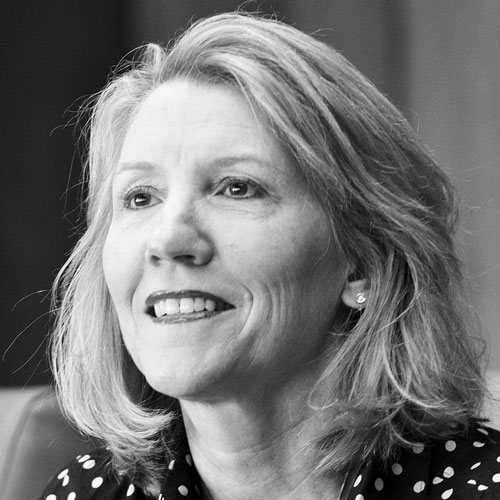The summer between college and law school was pivotal for Scott Askins Leonard. As an intern in Pepsi-Cola’s marketing department, the South Carolina native got to meet Richard Petty and other top race car drivers—Pepsi is a major sponsor of NASCAR. “It was so much fun, especially after majoring in corporate finance,” Leonard says.
It was soon back to business, though. That fall, she attended law school at the University of South Carolina and clerked in a number of firms, including in the litigation department at Nelson Mullin Riley & Scarborough. She then obtained a master of laws degree in taxation at New York University School of Law, graduating in 1995, when the market for initial public offerings (IPOs) and mergers and acquisitions was heating up, so she switched practice areas and moved to Nelson Mullin’s Atlanta office.
“Tax law was not a good fit for my personality, and I found litigation work slow and never-ending, but working on corporate transactions was fast-paced and exciting. I’m grateful that an opportunity opened up for me,” she explains.
In early 1996, Leonard worked on her first IPO, which launched her into a world in which she has become a major player. She continued working on IPOs and acquisitions as an associate at Alston & Bird, and even after joining WebMD as vice president, assistant general counsel, and assistant corporate secretary. In November 1999, while she was working on its IPO filing, WebMD was acquired by Healtheon. The combined company became known as WebMD one year later.
Leonard stayed on until mid-2001. She worked on transactions valued at an aggregate of more than $12 billion in just one eighteen-month period and helped navigate several joint ventures, including with Electronic Data Systems and Eli Lilly. “Those were heady days,” Leonard says. “A lot of writing on the back of napkins regarding new ideas and funding possibilities. A lot of very long hours. We had some real struggles, but it was exciting, and it remains a very successful company today.”
“I don’t know how you can negotiate a commercial contract if you don’t know what you’re selling.”
While at WebMD, Leonard shuttled between Santa Clara and Atlanta, but when the company moved its headquarters to New Jersey, she decided not to relocate and took some time off to travel. “A few months later, I ran into PGi founder, chairman, and CEO Boland Jones, who was considering divesting a business unit I’d helped them acquire as outside counsel. He asked if I could help, which I did, starting in December 2001, first as a consultant, and then as an employee.” Leonard was named executive vice president of legal, general counsel, and secretary of the Atlanta-based company in 2003.
The type of deals that had kept Leonard busy at WebMD continued at PGi. “We’re always looking for new technologies and services, for ways to deliver more value to our customers and provide the company with new opportunities for growth,” she says.
That is what prompted PGi’s acquisitions of Central Desktop and TalkPoint in 2014. Central Desktop provides a cloud-based collaboration and project management platform, extending PGi’s products beyond real-time. TalkPoint is a leading provider of webcasting software and services. “These acquisitions help round out our wheelhouse,” Leonard says. This “unified collaboration” approach represents a market that IDC estimates will grow to $5.7 billion by 2018.
Another arena PGi is moving into is “software as a service” (SaaS), also referred to as cloud-based services. The basic idea behind SaaS is that instead of installing software locally, companies like PGi develop, host, and maintain applications on the customer’s behalf, which are then accessed through a web browser. This model enables businesses to more easily and quickly deploy solutions throughout their organizations, without the expense and headache of installing and maintaining the software or the hardware on which it runs. It also allows for global and mobile accessibility, automatic updates, and end-user customization. “SaaS currently represents over 10 percent of our total revenue. Growing that business is our top strategic objective,” Leonard says.
While being on the cutting edge of new technologies obviously thrills her, Leonard admits it can be a struggle to take the company’s solutions into other countries. PGi serves nearly 50,000 enterprise customers, including more than 75 percent of Fortune 100 companies. “There are significant complexities associated with international operations,” she says. “We must understand all the different contract requirements, IP rights, tax issues, anticorruption and anti-bribery laws, and regulations regarding data protection and privacy everywhere we do business.”
“We have found that it usually works best to partner with a local company when we first enter a new country,” Leonard says. “They already understand how business is done and can help pave the way for a smooth entry. And it can take us awhile to get all the required business licenses.”
What would Leonard recommend to attorneys who would like to work for businesses as stimulating as WebMD and PGi? “First, learn how to read a financial statement,” she says. “That might seem obvious, but a lot of lawyers come out of law school not knowing about profit and loss statements, revenue recognition, or other financial items essential to running a business. I had an advantage since I was a finance major.”
Leonard says once you’re embedded in a company, learn its products. “It’s very important to understand the business you’re in and the specific products you sell,” she says. “I don’t know how you can negotiate a commercial contract if you don’t know what you’re selling. I want everyone on our legal team to be using our products.”
She has taken this philosophy a step further than most. “Our legal team interacts daily with people in sales, pricing, accounting, etc.,” she says. “I believe that regular contact is imperative to earning our internal clients’ trust, being brought in early in a deal, and comprehending the overall business strategy. The lawyers here are not allowed to just sit in a little bubble. How would they be able to truly understand the needs of the business if they did?”

